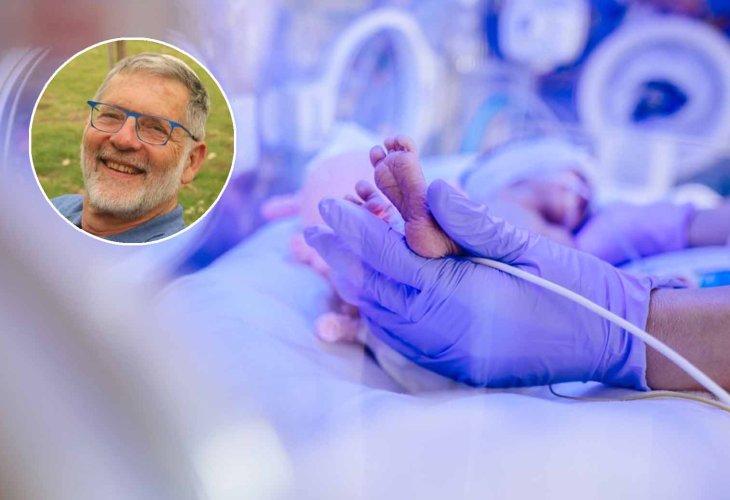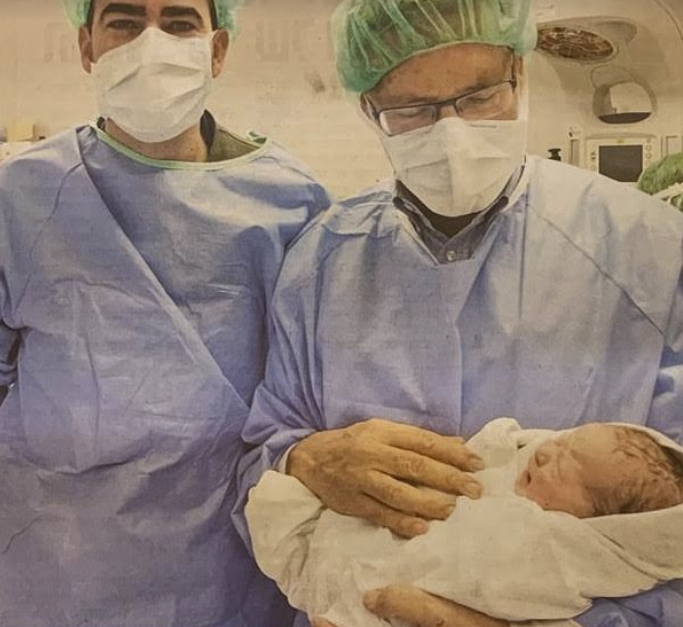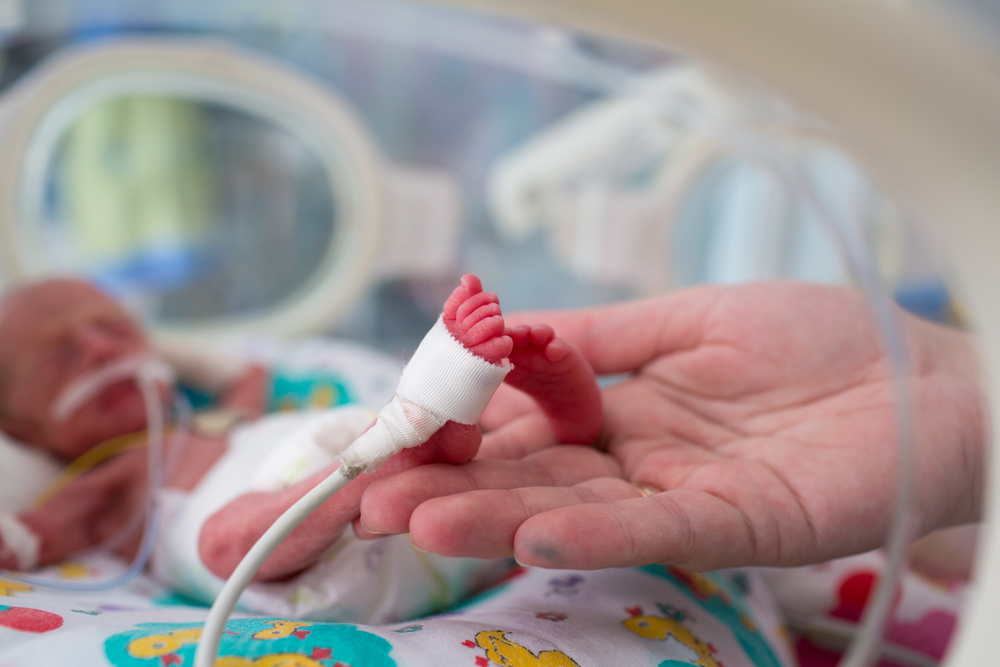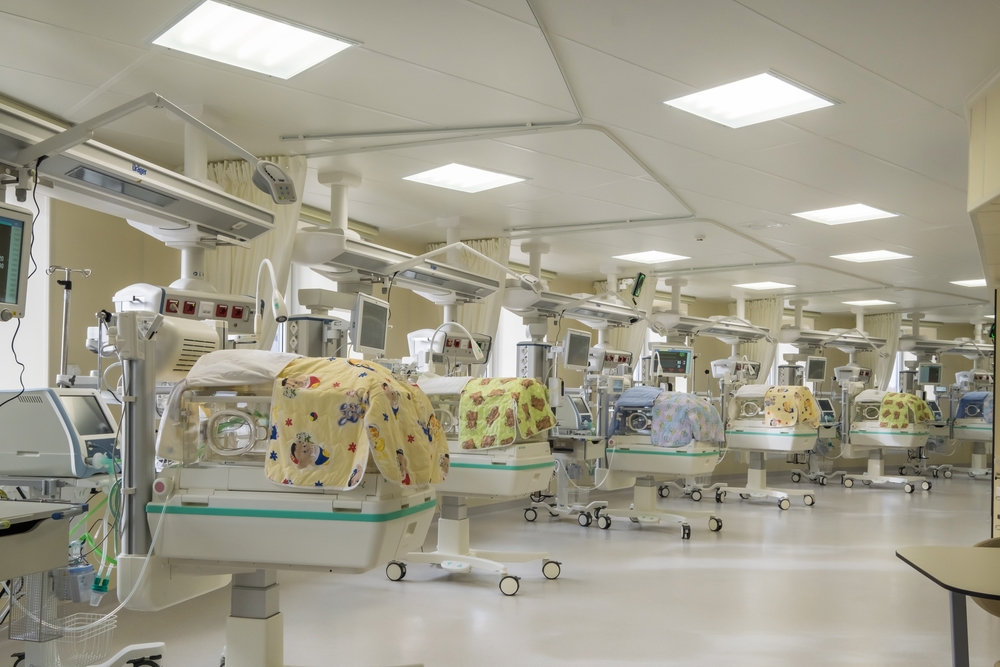The "Father" of Preemies: After Helping Thousands of Preemies, He Now Shares His Touching Story
Prof. Michael Schimmel, the legendary director of the neonatal unit at Shaare Zedek, unveils his personal journey, the unit's story, and the challenging dilemmas that haunted him over the years.
 In the circle: Prof. Michael Schimmel (Background photo: shutterstock)
In the circle: Prof. Michael Schimmel (Background photo: shutterstock)"Not many people take their mobile phones into the shower or hope it won't ring when they are called up to the Torah on Shabbat," says Prof. Michael Schimmel, aiming to illustrate the intensity of the last 45 years as head of the neonatal unit at Shaare Zedek Hospital.
He has worked in this field since a young age, having begun shortly after getting married, and continued until his recent retirement. Over the years, Prof. Schimmel has accompanied thousands of preemies and their families, and now, in retirement, he finally has the time to reflect and share his experiences.
"It's not just my story," he clarifies, "it's the story of the entire department and the countless preemies we lovingly supported, often when they were on the brink between life and death."

A Small Child and a Big Profession
Prof. Schimmel was born in the 1950s in Tel Aviv and followed a typical educational path like his peers. From a young age, he was drawn to the medical field, volunteering during high school for Magen David Adom and at Ichilov Hospital.
Where did your passion for this profession come from? Do you come from a family of doctors?
"Actually, no. My father worked in a mechanical factory, and my mother was not from the medical field either. Sadly, my father died very young. I remember discussing my dream of becoming a doctor with him shortly before his death. I expressed my fears about the immense responsibility, and he replied, 'Every profession carries responsibility. Even I, working in a factory making tin cans, could accidentally cause harm.' That conversation firmly solidified my goal to pursue medicine."
Prof. Schimmel notes that after his father's passing, his mother assured him that despite their limited financial means, nothing would prevent him from studying medicine. "And so it was," he says, "two days after my release from the IDF, I began my medical studies in Tel Aviv."
During that time, he met his future wife, a new immigrant from France. "Even before our marriage, my wife made it clear that she had moved to Israel to live in Jerusalem, not Tel Aviv, so I promised that after completing my medical studies, we'd move to Jerusalem. We did so in 1976, and I immediately began a pediatric residency at Shaare Zedek Hospital."
At that point, Prof. Schimmel hadn't planned on working with newborns in the neonatal unit. But around the same time, Prof. Eidelman arrived from abroad to establish the neonatal unit at Shaare Zedek. "I was asked to be Prof. Eidelman's right-hand man," he recalls, "It was a shift from my plans, as I always thought I'd work with adolescents. But as I got into neonatology, I fell in love with the relatively new field."
 (Photo: shutterstock)
(Photo: shutterstock)Two years later, Prof. Schimmel was sent by Prof. Eidelman for further specialization in neonatology abroad, gaining new tools and significant knowledge. "I returned and continued working in the neonatal unit," he recounts. "Since then, I've only worked in the neonatal unit at Shaare Zedek. It's my home and the only thing I've ever done in my life. Over the years, the unit went through many changes, mainly in its size. Although we started with seven beds, I retired with 65 beds, making it the largest in Israel."
"At Peace with Myself and with Hashem"
When Prof. Schimmel describes the responsibilities of a neonatal director, the weight of accountability is evident in his voice. "Every senior doctor, especially a department head, understands their immense responsibility," he explains, "In my case, it’s about saving lives daily because Shaare Zedek has about 22,000 births annually, and at any moment, something can go wrong, requiring constant vigilance.
"And it's not just physical work. It often entails making difficult decisions, like whether to continue resuscitation. You also need to consult the right experts and provide honest advice. Ultimately, the key is being at peace with yourself and Hashem because the parents' eyes are on you. They rely on you, and you have to know you've done all you can, to the best of your ability."
Do you think being a religious doctor influences your decisions differently?
"I hope not. As a doctor, my faith is one thing, but in the hospital, my role is to serve the patient and their parents. To achieve this, I frequently consult with esteemed figures from all circles to advise parents appropriately. I've also spoken with Muslim clerics or family heads when needed, understanding that every physician dealing with human life should know the culture of those they serve and consult figures that the families regard. I don’t think I behave differently from other doctors due to my faith—it’s all about ethics."
You've likely faced challenging situations over the years...
"Certainly, there have been cases where, despite our best efforts, the outcome differed from expectations. I recall a case where I gave a very small preemie a blood transfusion, which resulted in a rare complication that occurs about once in a million, leading to the baby's death. It was extremely hard, and I spent the day feeling terrible. But I knew I did what I had to and must understand that there’s always a potential cost to any decision, even if it's one in a million. Of course, it doesn't lessen the pain or tears when facing grieving parents."
 (Photo: shutterstock)
(Photo: shutterstock)In your experience, do believing parents cope better during their child's stay in the neonatal unit?
"I think parents with faith, regardless of what kind, generally find it easier to accept even challenging situations. The belief that everything is divinely guided and not coincidental is very comforting during such times.
"I see it especially when parents face difficult treatment decisions. They often say, 'We’ll ask the rabbi,' and from then on, things become clearer—the rabbi decides, and they follow, as it’s seen as divine wisdom. There's no doubt that for parents with faith and respect for religious teachings, challenges are easier to bear."
The Wonders of Creation in the Neonatal Unit
What kept you going in such a demanding job for 45 years?
"The immense satisfaction, of course, as you witness daily miracles and the wonders of creation. Seeing tiny infants enter the unit at incredibly low weights and leave fully functional, healthy, and beginning a normal life is incredibly fulfilling. Just recently, I attended the wedding of a girl who was born in our unit at 519 grams. She's now 23 and getting married. It was so moving. In another case, a senior doctor joined our team and turned out to be a preemie I treated in the past—that was a very special full circle moment. Few people can say they experience such profound satisfaction in their work daily.
"There's also the support I've received throughout from my wife and kids. I have, thank God, seven children who sacrificed quite a bit for their father’s demanding job. They’ve always supported me, and I’ve drawn much strength from them."
Has neonatal care improved over the years?
"There has certainly been significant improvement because we continually learn and optimize. It's a field where mastering skills is crucial. Personally, I traveled extensively for courses and training abroad to learn new treatment methods. Today, we have innovative treatments not known before, equipment that didn’t exist initially, and overall, better statistics. We succeed in saving the lives of many preemies, including very small ones. Importantly, we also provide them a good quality of life."
Is it true that in Israel, resuscitation is not performed on preemies born before 23 weeks?
"Indeed, in our country, lifesaving treatment isn’t provided to preemies under 23 weeks. That means any preemie up to 22 weeks and 6 days doesn't receive treatment. There are places globally experimenting with treating smaller preemies, but it’s not yet relevant here."
* * *
If anyone thought Prof. Schimmel would relax after 45 years of work, it turns out he’s not one to rest. "Just days before retiring," he shares, "I approached the Jerusalem municipality, proposing a special service exclusively for children discharged from the neonatal unit. The idea was warmly received, leading to the establishment of three centers in the city. I visit them several times a week, meeting parents and reviewing everything said during discharge. Studies show that parents tend to forget a high percentage of the information given, so this is the time to clarify things. Additionally, I continue to visit Shaare Zedek Hospital a few hours weekly, sharing my expertise, and I recently released a book titled 'Beyond the Scene,' which narrates my life's story and that of the profession and the neonatal unit from behind closed doors, often hidden from the public eye. I owe much to my literary editor Chayuta Deutsch, who guided me, and to my wonderful granddaughter who designed the book's cover."
What about some rest and relaxation?
"Since retiring, my wife and I have decided to take two days off weekly to spend time together and invest in our relationship. It’s just as important as work, I’m sure."

